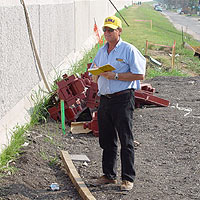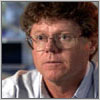
On this page, you'll find regularly updated audio, video, and text reports from our producers and correspondents. We invite you to join the discussion about topics covered here on our board and to subscribe to our audio and video podcasts to download these reports to your computer or MP3 player.

Ivor Van Heerden inspects the 17th Street flood walls in New Orleans on September 19, 2005. |
9.19.2005 "Dear Friends and Family"Dr. Ivor Van Heerden is a hurricane expert at Louisiana State University who has long predicted the disaster caused by Katrina. He appeared in the January 2005 NOVA scienceNOW segment on hurricanes. In a 2002 article in which he is quoted, he sounds eerily as if he is speaking after Katrina rather than three years before. Dr. Van Heerden wrote this moving e-mail message to loved ones and friends in the early hours of September 7, 2005.
Dear friends and family, It is midnight, and I have just finished my umpteenth TV interview, this one with CNN at home. I am tired, angry, disgusted, very sad, and at times unbelieving of what I have witnessed. I am also thankful for the great team of hurricane researchers I am honored to call my friends. All have risen to the occasion and are still making huge sacrifices in effort and time away from their families. Also, my family have been so supportive, especially my wife. She and my youngest helped out at an Adventist Disaster support program this past weekend. My daughter met 6 kids who had lost their parents. She gave a bracelet to a small baby girl. Yes, this catastrophe has touched us all. So much has happened in just a few days. Saturday a week ago we called for Katrina to flood New Orleans. I remember telling my friend and coworker Marc, "I am afraid this is the big one." It is with no honor or pride that I acknowledge that we called it right. The catastrophe has played out right as we expected. What was not expected was the lack of response from the Federal government—the leaving of these people for days with no help. Some of the cell calls I got will haunt me for the rest of my life. A policeman friend tells harrowing tales—he was in the front lines. Monday, the storm evening, everyone at the State emergency operations center (EOC) was congratulating each other that we had once again "dodged the bullet." But we had not. I will never forget the chill when someone came to me at the EOC and asked if we knew why a nursing home was seeing the water rise half a foot per hour. Initially we felt it must be because the home was in a lower part of New Orleans and, the pumps being out, that the water was just rain runoff. But an hour later the significance hit me—the levees must be failing. That was while driving home dead tired after no sleep for 36 hours. I assumed the Corps of Engineers, who basically own the levees, would be warning everyone. But the call never went out, so thousands of people went to bed in the dark, in a dry home, and in the middle of the night would have suddenly found the water in their homes. So many of these retreated into their attics. I can understand why. It was dark, there was no power, no phone, no TV, no radio, no mass communication whatsoever. Many were old and that was their only line of escape—into the attic. Except if you don't have an axe, if you are not strong, how do you escape? I am sure hundreds died in their attics. Should I have turned around and gone back to the EOC? Maybe, but I thought "the Corps must be monitoring the levees, surely they would sound the alarm." But no one did, so I believe more than 1,000 died while I slept, and nobody sounded the alarm. By the morning it was too late. I have also soul-searched if I could have done more to warn people of what would happen. Those Federal officials that scoffed at me and others in our Public Health Center when we told our story, maybe I should have called them out and beat their brains out. Lots of maybes, and still I ask myself "could I have done more?" My heart is so, so heavy. I cannot look at the TV, and luckily our cable is still out so I don't see any. I haven't even tried to see myself on the telly. There is no joy or pride in being in the news all the time, no pride or joy in the hundreds of interviews I have done over the phone and on TV, some even while trying to cut up a tree that was blocking our driveway. Nothing but a deep sadness, for it is those with the least support resources who suffer the most. So what drives me now? Well, those who have suffered and those still suffering need a voice, and most importantly for me, the truth must be out. This past Sunday I flew the whole disaster zone, the destruction immense but nothing more sad than the hundreds of homes with water up to the eaves of the roofs, some totally submerged, chemical slicks everywhere, fires. The destruction and knowledge that below me were many who, if not dead already, would soon die, trapped, deserted. I cried like I have not cried in a long time. Flying with me was a professional photographer friend. I could see the pain in his eyes as well. So, I now end this note. Tomorrow is another day, lots of interviews lined up, and lots more to do in our support of the recovery efforts. A research program to adapt to the new circumstances. Building a library as it unfolds. And perhaps there is a sabbatical in this, perhaps a chance to capture all this in a book. As a scientist I called it right; as a human I feel its pain; but as a researcher—perhaps there is a lesson here for others. Please pray for the people of Louisiana, Mississippi, and Alabama. All our lives have been changed forever. Ivor
P.S. My sailboat made it. I had tied it up in a swamp. It is stuck because of a
large submerged tree but still afloat. Maybe this weekend I will go get her.
But who feels like sailing right now?
|
|||||||||||

Ivor van Heerden is deputy director of the Louisiana State University Hurricane Center and director of the Center for the Study of Public Health Impacts of Hurricanes. Since 2001, he has been the lead principal investigator on a research team studying the public health impacts of major hurricanes and flooding in New Orleans. He appeared in the January 2005 NOVA scienceNOW segment on hurricanes. |
||||||||||||
|
© | Created September 2005 |
||||||||||||